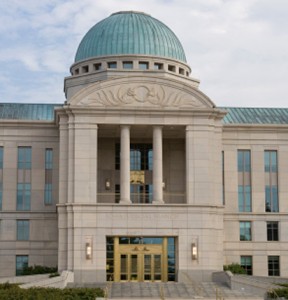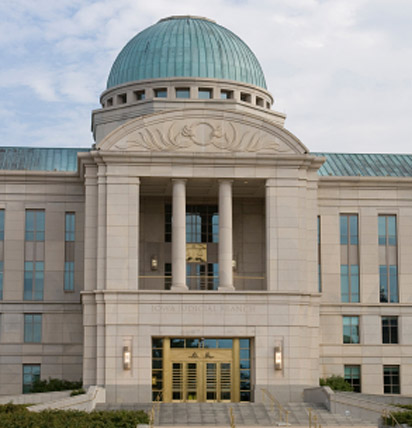
Rod Boshart, CR Gazette –
It’s still a long-shot proposition, but Iowans may be slowly and incrementally setting up a situation where Gov. Terry Branstad could become the first governor in history to appoint the entire Iowa Supreme Court.
For that to happen, Iowa voters would have to continue on the path they started in 2010 of rejecting justices who participated in the 2009 landmark same-sex marriage decision. Also, Branstad would have to seek and win an unprecedented sixth, four-year term as the state’s chief executive — scenarios that few are willing to dismiss out of hand pending the outcome of the Nov. 6 retention vote for Supreme Court Justice David Wiggins.
Wiggins’ defeat would set up a situation in which Branstad would appoint a replacement in 2013 that would mark the fourth justice he has named to the seven-member panel since returning to office in January 2011.
The three remaining justices who participated in the unanimous decision in April 2009 that struck down a state law that defined marriage as only between one man and one woman — effectively legalizing same-sex civil marriage in Iowa — are scheduled to stand for retention votes in November 2016 should they choose to continue to serve on the bench. They are Chief Justice Mark Cady and Justices Brent Appel and Daryl Hecht.
Former Chief Justice Marsha Ternus and Justices David Baker and Michael Streit were ousted by voters two years ago.
“It’s a pretty big leap of hypotheticals,” said Steve Davis, spokesman for the Iowa Judicial Branch.
True, but there was dismissive talk when reports began circulating that Branstad could come out of retirement after leaving office in 1999 to run for governor in 2010 and when critics of the marriage ruling launched plans to defeat the seven justices when each came up for retention.
A successful retention outcome for Wiggins would render the discussion moot, but judicial experts express confidence that Iowa’s merit-selection process provides an insulating firewall that prevents a governor from exercising too much influence in the process of nominating and appointing judges.
“I think our merit selection system insulates the system from that concern or at least helps to assure that that should not be a cause for alarm,” said Cynthia Moser, a Sioux City attorney who is president of the Iowa State Bar Association.
Under the merit-selection process established by a constitutional change approved by Iowa voters in 1962, the State Judicial Nominating Commission — a panel of licensed attorneys elected by lawyers and lay members appointed by the governor and all confirmed by the Iowa Senate — accepts applications for Supreme Court vacancies and forwards three nominees to the governor. The governor then appoints one.
“You have a filtering process,” said Bob Rafferty, a former GOP legislator and past Branstad staff member. “I think that really minimizes the potential danger of one governor appointing all the justices.”
However, Iowa State Bar Association officials note that the redistricting process following the 2010 census has drawn new judicial district boundaries, which in turn requires all of the nominating commission members to be replaced en masse rather than the normal process of staggered terms. That puts Branstad is in a position to appoint half of the nominating commission’s new members.
University of Iowa law professor Todd Pettys said the nominating commission is an important check on the power of the governor, so it becomes even more important for the public to closely scrutinize who goes on the commission and how they select future slates of candidates for judicial appointments.
“It’s a particularly important time for the public to pay attention to these judicial issues well beyond this upcoming election,” Pettys said.
Mark McCormick, a Des Moines attorney who previously served on the Iowa Supreme Court and the judicial nominating commission and ran for governor in the 1998 Democratic primary, said he did not see a cause for alarm even if the scenario plays out that Branstad ends up appointing all seven Supreme Court justices.
He served on a court where eight of the nine justices were appointed by then-Gov. Robert Ray and found the panel to be “refreshingly free of any political implications.” McCormick said he saw the role of political connections manifested in the appointment process, but added that during his time on the court “I never saw anything that I would attribute to a political connection outside the court.”
“It would be silly for someone to have a political motivation for wanting to be a judge because there just is no Democrat/Republican decision that’s made when you’re presiding over a trial or sentencing a person who has been convicted of a crime,” he said.
Others pointed to a unanimous decision by the Iowa Supreme Court — including Branstad’s three most-recent appointees — last March that ruled the governor’s use of a line-item veto was unconstitutional in redirecting money the Legislature had earmarked to keep workforce development offices open as evidence of Iowa’s tradition of judicial independence and separation of powers among the three branches of government.
McCormick said the one-time change in the makeup of the State Judicial Nominating Commission is “certainly going to be something dramatic compared to the way the commission has functioned up until now” but he said he would be surprised if it affected the way the process has functioned over the years.
Bob Vander Plats, head of Iowans for Freedom — the group that is actively campaigning to defeat Wiggins in the Nov. 6 retention vote — said he would like to see Iowa adopt a new process for appointing judges to the bench whereby the governor would make judicial appointments subject to confirmation by the Iowa Senate and the people would have a voice by continuing to vote on the retention of judges and justices.
“The Bar Association has got a heavy influence on who becomes our high court justices and that is why they have so much at stake here, that is why they are so passionate about protecting that institution versus defending the Constitution,” he said during a recent “Iowa Press” show on Iowa Public Television.
Moser refuted Vander Plats’ contention that the process is dominated by her association and said his comments show “there is a much broader agenda at play here, which is a wholesale change to a system of selecting judges, our merit selection process which has served this state so well for 50 years.”
Under Iowa’s current system, she said, citizens “can feel confident that regardless of the political party of the governor, who appoints a particular judge or justice, that person has been thoroughly vetted and the oath that they take will assure that they’ll continue to make decisions that are based on the constitution and the law and not on political affiliation or personal beliefs or philosophies.”







